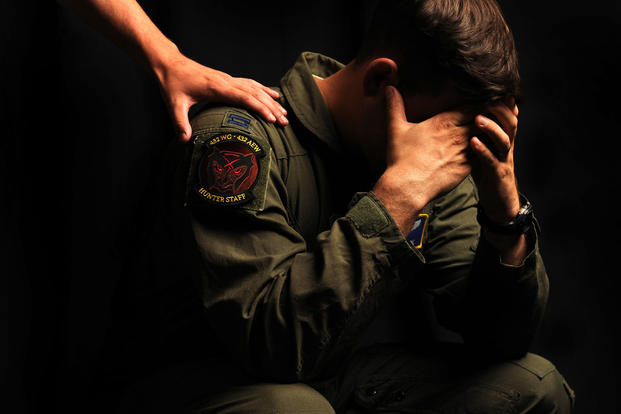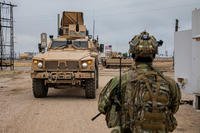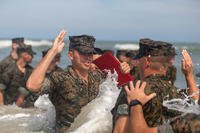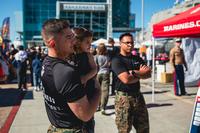We've seen it all too often: U.S. servicemen and women return from war with devastating psychological wounds. Having experienced the unthinkable on the battlefield - brutal firefights, carnage, and the violent deaths of their comrades - they often return home plagued by anxiety, depression, and sometimes Post Traumatic Stress Disorder (PTSD). PTSD is a disorder that develops in some people who have experienced a shocking, frightening, or dangerous event, such as our warfighters experience while serving on the frontlines.
According to the Department of Veterans Affairs, PTSD afflicts up to one in five veterans from Iraq and Afghanistan in a given year, and as many as one in three veterans from earlier conflicts, like Vietnam, during their lifetimes. As of 2013, roughly 400,000 veterans affiliated with the VA carried this diagnosis. These figures suggest that psychological trauma is a staggering burden on our active-duty troops, our veterans, and our society.
As a medical doctor with the United States Navy, I saw first-hand the devastating toll PTSD can take on our servicemen and women and their families. After putting their lives on the line for their country, experiencing the horrors of war, and coping with the deaths of friends, returning home and resuming a normal life can be a challenge for any service member. But for someone suffering from PTSD, it can be a crisis. We owe it to these vets to get them the help and treatment they need.
The unfortunate reality is that we didn't really understand the science of PTSD until recently, so we didn't know how to treat our vets. We put some on heavy drugs, we hospitalized others, and some we'd just send on their way and tell them to try to forget about their experiences. But things have changed, and we now know that taking a holistic approach to treating those suffering from PTSD greatly improves the chances for recovery.
Many types of therapeutic techniques can help our veterans process and come to terms with their combat experience and gain control over their lives.
The leading treatment for PTSD is talk therapy, also known as or psychotherapy. Psychotherapy combined with medications is often very successful in treating PTSD. But beyond psychotherapy and medication, emerging treatments have been proven highly effective. Clinicians increasingly believe that it is important to employ one or more of these therapies along with psychotherapy and medication in a holistic treatment approach.
- Mindfulness – According to a new study, adding mindfulness to traditional therapy could be beneficial for soldiers with PTSD. Mindfulness is meant to include not only focusing attention on sights, sounds, smells, tastes and touch that we experience but to notice bodily sensations occurring within us as well. Mindfulness includes meditation, yoga, breathing exercises and tai-chi. Mindfulness has been shown to decrease the heart rate and blood pressure.
- Art therapy – Art therapy is a relatively new path to overcoming the trauma of war. When someone expresses how he or she really feels through art, the mind can begin to let go of the trauma by transferring the images and ideas to another object of the patient's creation. Art therapy can help veterans communicate traumatic memories, relieve stress, and reduce symptoms of trauma-related disorders.
- Craft Therapy – Craft Therapy has been proven to be extremely effective in treating those with PTSD, and there is ample evidence to suggest that craft therapy has a positive overall impact on brain function. First and foremost, craft therapy helps vets take their minds off the events that may have led to their illness. Engaging in craft activities has been shown to address cognitive, neurological, and sensory-motor needs by targeting performance skills. In fact, craft therapy has been shown to help promote the use of right- and left-brain functioning and help maintain cognitive functioning.
Now through my role as a board member for Help Heal Veterans, I've seen first-hand how instrumental these emerging therapies can be. Recently, I visited with some veterans at a Help Heal Veterans center in Fort Hood, Texas. As I watched a vet working on his craft kit, his wife told me that the kits may have saved his life. Before starting craft therapy, her husband was on the verge of suicide, but since he started craft therapy, he has felt a greater sense of pride and purpose. Craft therapy also gave him opportunities to develop relationships and helped him feel productive, which in turn helped ease his feeling of being deprived of a useful occupation. Craft therapy also helps the vets to connect with family and friends in a way they couldn't prior to engaging in the therapy by working on the craft kits together.
The sad reality is that war will probably be with us in some form or another for the foreseeable future, and many of our vets will come home with psychological wounds. Fortunately, the medical community is learning more about effective treatments every day. As we mark PTSD awareness month, let's remember that we owe it to our vets to get them the best treatment they need and deserve.
CAPT (Ret) Stuessi served in the U.S. Navy for 23 years as a Family Practice/Sports Medicine physician. His last tour was as Medical Director of the Concussion Care Clinic at Naval Hospital Camp Pendleton. He now serves on the Board of Directors of Help Heal Veterans, the nation's largest provider of free therapeutic arts-and-craft kits to U.S. veterans and active duty military personnel.










